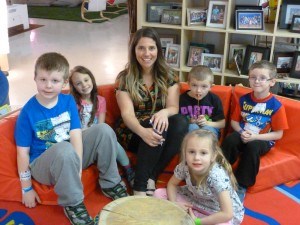
A Jasperite is among a group of teachers and administrators credited for implementing an award winning kindergarten program at St. Gregory Catholic School in Hinton.
The program–known as Happy Creek Learning Centre–is the brainchild of Lee Ann Cross, who formerly worked for Community Outreach Services (COS) in Jasper.
Earlier this month the Canadian Education Association recognized the program and awarded the school the Ken Spencer Award for Innovation in Teaching and Learning.
“It’s an honour,” said Cross, about the school winning the national award.
“This wouldn’t have happened without our whole school, from the top down. Everyone has been so supportive.”
About four years ago the school transformed its early childhood/kindergarten classroom environment into the Happy Creek Learning Center, which offers a play-based, multi-age, hands-on learning model driven by the students’ interests and passions.
According to the school, the new approach has increased student engagement as well as enrollment, with 50 students enrolled in the program this year.
Part of the program’s unique approach is its focus on “team teaching” and the Reggio Emilia philosophy.
The Reggio Emilia approach is an educational philosophy based on the principles of love, respect and community through exploration and discovery based on the interests that emerge from the children.
For example, in the fall teachers observed that the children had a keen interest in pumpkins. As a result, pumpkins were used to engage and teach students about artistic expression, literacy and numeracy.
“It’s an emerging curriculum,” said Cross, explaining Reggio Emilia is widely respected among early educators and scholars for it’s unique approach to teaching young children.
To apply the philosophy teachers spend a lot of time observing the children and what they’re interested in, and then develop projects or change their learning centres to reflect those interests.
In May 2015 the school took it one step further, knocking down a wall to merge two classrooms together so teachers could pool their resources and allow students to seamlessly move about as they direct their own learning.
Cross credits the success of the program to her experience working for COS.
“I can not stress enough how amazing COS is. I had so many amazing mentors that deserve recognition,” said Cross, specifically mentioning Lynda Shore, Brenda Hill and Annegret Keyes.
Despite the success of the program, Cross acknowledged that there was some initial resistance from parents who were skeptical about the idea of play-based learning.
“Some people think it’s play all day long, when really there’s a hour chunk in the morning and an hour chunk in the afternoon, because research shows they need a solid piece of time to really get into their play and for the deeper learning to happen,” she said.
“We do lots of small group work and they’re very rarely all 50 together—maybe a couple times a week—but they’re divided into smaller groups and then smaller groups from that.”
Tim Fafard, the school’s principal, said he was proud of the program and praised Cross for her leadership and dedication.
“She’s been one of the main drivers of this program. Her leadership has been phenomenal,” said Fafard.
“Being recognized is a huge feather in our cap.”
Paul Clarke [email protected]
